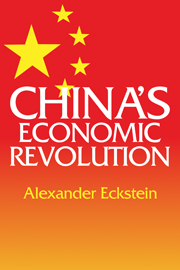Book contents
- Frontmatter
- Contents
- List of tables
- Preface
- 1 The economic heritage
- 2 Development strategies and policies in contemporary China
- 3 Property relations and patterns of economic organization in China
- 4 The resource-allocating system
- 5 The quest for economic stability
- 6 Economic development and structural change
- 7 The role of foreign trade in China's economic development
- 8 The Chinese development model
- Notes
- Index
1 - The economic heritage
Published online by Cambridge University Press: 28 October 2009
- Frontmatter
- Contents
- List of tables
- Preface
- 1 The economic heritage
- 2 Development strategies and policies in contemporary China
- 3 Property relations and patterns of economic organization in China
- 4 The resource-allocating system
- 5 The quest for economic stability
- 6 Economic development and structural change
- 7 The role of foreign trade in China's economic development
- 8 The Chinese development model
- Notes
- Index
Summary
The relevance of the past
The economic policy and performance of the People's Republic has been shaped by certain characteristics growing out of China's long history, the country's stage of development, and the 1949 revolution. In a fundamental sense China's economic development since 1949 is the product of both continuity and change. As revolutionary as the changes have been in the past twenty-five years, the actual course of development can be much better understood against the background of China's heritage.
One of the most crucial questions is what elements of the Chinese experience inherited from the past may have fostered or hampered China's economic development. Clearly there are no simple answers to this question. Moreover, the answers given would depend on whether one were exploring the problem in prospect – that is, before rapid and sustained development was started – or after it was fully and visibly underway for a certain period of time. Thus the assessment of the role of China's heritage in the country's economic development would almost certainly be quite different and much more pessimistic seen from the perspective of the 1930s as compared to that of the 1970s.
Similarly, an informed observer appraising the prospects for economic development and modernization in Asia from the vantage point of 1840 might have picked China – rather than Japan – as the most likely candidate. China was a vast empire more populous than Japan, much better endowed with mineral resources and large internal markets. Even in terms of social and political institutions, China might have appeared to be in the better position.
- Type
- Chapter
- Information
- China's Economic Revolution , pp. 1 - 30Publisher: Cambridge University PressPrint publication year: 1977

